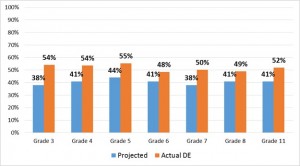Smarter Balanced scores set new baseline for students’ progress toward college and career readiness
Statewide assessment results released today provide a new baseline for how Delaware students are performing in English language arts and mathematics. The 2015 Smarter Balanced Assessment results are the first ever scores for the test, which is aligned with the Common Core – Delaware’s new, higher, academic standards. By focusing on skills most important for students to succeed in college and the workplace, the results provide teachers and families with a snapshot of children’s progress, helping identify school and student strengths, as well as areas in which they need support.
Statewide, more than half of students in third through eighth grades and in grade 11 were “proficient’ or better in English. In math, almost 39 percent were statewide. Delaware students outperformed estimates – based on a 2014 national field test — in both subjects for every grade with the exception of 11th grade math.
More than four million students took the field test that was used to set expectations for how students would perform when Smarter Balanced was first offered last spring. Following that test, educators, school leaders, higher education faculty, parents and others worked together to develop benchmarks for students to reach different achievement levels (one through four), with students scoring 3 or 4 considered “proficient.”
At the time, then-Smarter Balanced Executive Director Joe Willhoft noted: “Because the new content standards set higher expectations for students and the new tests are designed to assess student performance against those higher standards, the bar has been raised. It’s not surprising that fewer students could score at Level 3 or higher. However, over time the performance of students will improve.”
Grade-level results in English language arts/literacy ranged from a high of 55.5 percent scoring proficient or higher in fifth grade to a low of 48.5 percent in sixth grade. In math, the grade-level results ranged from a high of 53.1 percent in third grade to a low of 23.3 percent in grade 11.
“The Smarter Assessment is harder, and different, from any of our past state assessments. It tests more skills than we’ve ever tested before and does so more rigorously,” Gov. Jack Markell said. “We made this change because these are the skills our children will need to succeed in the rest of their careers and we need to provide them with as much help and support as we can while they are still in our care.
“As we all expected, the overall results of this more rigorous assessment show that we still have a lot of work to do to prepare all of our students for college and careers, but we know our schools continue to make progress, and we are pleased that the results are better than anticipated by the national test.” he said.
As a governing state in the Smarter Balanced Assessment Consortium, Delaware partnered with other states to develop the Smarter Balanced Assessment System. Delaware educators have been integral to many aspects of the new assessment system, including question development, standard setting, report development and the creation of professional learning resources for teachers. In spring 2014, educators and students across Delaware participated in the successful national field test of new assessment items and the accompanying technology.
Today’s release included aggregate and grade-level results for the two subjects at the state, district and school levels. Final results, which also will include additional analysis looking at scores by student subgroup, will be released on Thursday, September 17, in conjunction with the State Board of Education meeting.
Statewide English Language Arts Projected vs Actual Proficiency
Note: “Projected” is based on the national field test conducted in Spring 2014. “Actual DE” are the results from Delaware students on the 2015 Smarter assessment.
Statewide Mathematics Projected vs Actual Proficiency
Note: “Projected” is based on the national field test conducted in spring 2014. “Actual DE” are the results from Delaware students on the 2015 Smarter Balanced assessment.
About Smarter Balanced
The Smarter Balanced results measure Delaware students’ progress toward the academic goals laid out in the Common Core State Standards, which were designed to ensure students have the skills and knowledge they need in jobs and college. The standards set learning expectations for what students should know or what skills they should master at the completion of each grade level. Individual districts determine their own curricula and decide how those skills and knowledge are best taught.
Based on the first administration of a completely new state assessment that is aligned to new, more rigorous standards, the 2015 Smarter results represent a new baseline for Delaware students’ performance in English language arts/literacy and mathematics.
The new Smarter exams test different content and skills than the old exams (Delaware Comprehensive Assessment System or DCAS) tested so the scores cannot be compared directly. Recognizing this transition, the state is delaying the use of the results for teacher evaluations for the next two years. As expected, the results look different from those under the old test. This does not mean that students are learning less. Rather, it reflects that the bar has been set higher.
The new Smarter test asks students to demonstrate and apply their knowledge and skills in areas such as critical thinking, analytical writing, and problem solving.
“The results reflect a change in expectations for what students should know and be able to do, not a change in their abilities,” Secretary of Education Mark Murphy said.
While the transition to Common Core required some shifts in ELA, particularly regarding the use of more complex texts and in the areas of research and writing, the biggest changes from Delaware’s previous standards were in mathematics. Changes included the scope and sequence of material as well as procedural methodology. Because of the extent of shifts needed, the transition has been more significant in mathematics compared to ELA in many classrooms.
Over the past few years, the department has provided professional learning to thousands of educators across the state to support this transition, and in the coming year, the state will continue to offer quality professional learning opportunities for educators, particularly those who teach mathematics. The state also will offer competitive incentive grants for districts and charters to further their educators’ professional learning around Common Core. And the state is looking at other innovative professional learning opportunities to strengthen supports for Delaware’s math educators.
Value of the assessment results
While no single test can give a complete picture of achievement, annual assessments can provide important information about student progress and areas for improvement, especially when combined with student grades and teacher reports.
Educators use the assessment data in many ways. The scores are used to examine how well students are doing in districts, schools, grades and individual classrooms. Importantly, districts use this data to investigate how aligned their curriculum is to the standards—what children should know and be able to do in each grade. They also use it to make decisions about where to focus professional learning for their educators. Principals can use this information to help understand if certain grades or classrooms are doing especially well and should be models—or identify where teachers or students might need extra professional development or support. Teachers can use the information about their current students to see if extra focus is warranted in a specific skill area.
“This is important data for our schools as a whole. It gives us a baseline so that our educators can use the results to identify students’ strengths and needs to be addressed this year. It also gives us important information about where curricula is well aligned to the standards or where we need to adjust it this year,” Colonial School District Superintendent Dusty Blakey said.
Indian River Superintendent Susan Bunting agreed.
“Our teachers will be digging into these data in the coming weeks as they meet with their peers in professional learning communities, looking for trends that show how their classes and schools can adjust instruction to better prepare students with the skills they need,” she said.
New Castle County Vo-Tech Superintendent Vicki Gehrt, president of the Delaware Chief School Officers’ Association, said the results establish a new baseline that “enables all of us to know where our students stand regarding their Smarter score.
“Whether they want to go to college or straight into the workplace, students need to be able to think critically and solve complex problems,” she said. “We must collectively stand committed to providing our teachers the necessary professional development and resources to further strengthen their instructional delivery, ensuring that our students have the skills to empower their future success.”
Nationally, states are in various stages of score reporting. In time, scores of all states using the assessment will be aggregated and provide more context for student performance across the country.
Find results by district and school here.
For more information about the new assessments, families should visit www.DelExcels.org.
###


